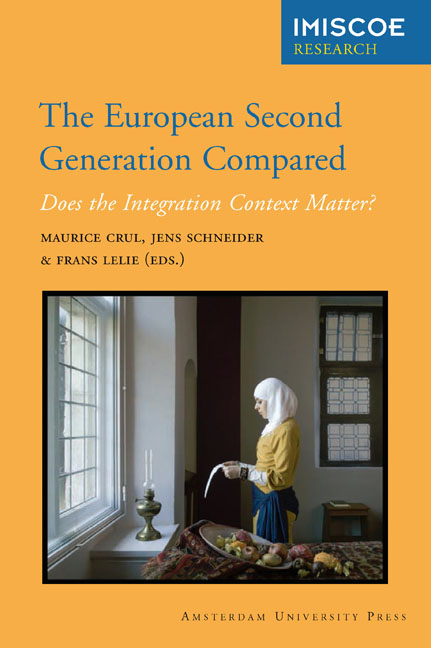Book contents
- Frontmatter
- Contents
- Acknowledgements
- 1 Introduction
- 2 Comparative Integration Context Theory: Participation and Belonging in Diverse European Cities
- 3 Research Methodology
- 4 The TIES Respondents and their Parents: Background Socio-Demographic Characteristics
- 5 School Careers Of Second-Generation Youth in Europe: Which Education Systems Provide the best Chances for Success?
- 6 Assessing the Labour Market Position and Its Determinants for the Second Generation
- 7 Union Formation and Partner Choice
- 8 Identities: Urban Belonging and Intercultural Relations
- 9 Ways of ‘being Muslim’: Religious Identities of Second-Generation Turks
- 10 Conclusions and Implications: The Integration Context Matters
- List of Contributors
- Other IMISCOE titles
1 - Introduction
Published online by Cambridge University Press: 09 January 2021
- Frontmatter
- Contents
- Acknowledgements
- 1 Introduction
- 2 Comparative Integration Context Theory: Participation and Belonging in Diverse European Cities
- 3 Research Methodology
- 4 The TIES Respondents and their Parents: Background Socio-Demographic Characteristics
- 5 School Careers Of Second-Generation Youth in Europe: Which Education Systems Provide the best Chances for Success?
- 6 Assessing the Labour Market Position and Its Determinants for the Second Generation
- 7 Union Formation and Partner Choice
- 8 Identities: Urban Belonging and Intercultural Relations
- 9 Ways of ‘being Muslim’: Religious Identities of Second-Generation Turks
- 10 Conclusions and Implications: The Integration Context Matters
- List of Contributors
- Other IMISCOE titles
Summary
Introduction
Immigration and the subsequent integration of newcomers is one of the foremost challenges for European cities. The integration of children born to immigrant parents in countries of migration is critical, for this second generation, as they have come to be known, constitutes a growing share of metropolitan youth today. Research on the second generation is particularly pertinent because it can respond to many universal questions concerning integration.
With an extra push from the late-2000s’ financial crisis, the public debate has taken a dramatic shift against immigrants and their children. In Europe, the so-called threat of Islam is being put on the political agenda by one populist party after another. Their popularity in the Netherlands helped produce a minority government that, since 2010's parliamentary support agreement, has had to rely on votes by the downright anti-immigrant Party for Freedom (PVV). The PVV's vetoing power enables this party to highjack the topic of migration and integration, normalising bold anti-immigrant discourse that links unemployment, crime and Islamist extremism with immigrants and their children. In 2011, we saw an extreme – and hopefully rare – expression of the depth of anti-immigrant anxiety in Norway. The right-wing zealot who took the lives of 77 people, mostly teenagers attending a Norwegian Labour Party youth camp, claimed that he wanted to root out the next generation of social democrats and their immigration politics. This xenophobic predilection is even pronounced in the most strongly assimilationist country of Europe. France's anti-immigrant voice is Marine Le Pen, the popular leader of the Front National who has gained prominence in the political arena. Meanwhile, though relatively moderate leaders, Prime Minister Cameron of the United Kingdom and Germany's Chancellor Merkel both recently declared that multiculturalism has failed. Social Democratic Party (SPD) member Thilo Sarrazin, a former board member of the German Federal Bank, amplified Merkel's statement in a controversial book, arguing that Muslim immigrants do not want to integrate and are happy to fall back on criminality and welfare instead. This debate echoes worries about the emergence of a Parallelgesellschaft, a ‘parallel society’ in which two million people of Turkish descent are seen as living detached from the wider German society.
- Type
- Chapter
- Information
- European Second Generation ComparedDoes the Integration Context Matter?, pp. 11 - 18Publisher: Amsterdam University PressPrint publication year: 2013



